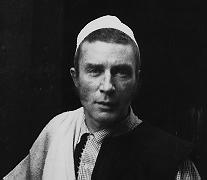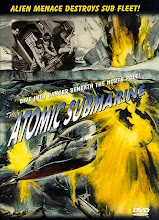 According to Google Labs' fairly new "Books Ngam Viewer," which tracks usage of words and phrases in all the books Google has scanned dating from 1800 through 2000, the use of the word "Cubism" (and closely varients) peaked in 1960. Click on the image for a larger view.
According to Google Labs' fairly new "Books Ngam Viewer," which tracks usage of words and phrases in all the books Google has scanned dating from 1800 through 2000, the use of the word "Cubism" (and closely varients) peaked in 1960. Click on the image for a larger view.
Sunday, January 30, 2011
"Cubism" peaked in 1960
 According to Google Labs' fairly new "Books Ngam Viewer," which tracks usage of words and phrases in all the books Google has scanned dating from 1800 through 2000, the use of the word "Cubism" (and closely varients) peaked in 1960. Click on the image for a larger view.
According to Google Labs' fairly new "Books Ngam Viewer," which tracks usage of words and phrases in all the books Google has scanned dating from 1800 through 2000, the use of the word "Cubism" (and closely varients) peaked in 1960. Click on the image for a larger view.
Tuesday, January 25, 2011
cyborgs and space
 Manfred Clymes and Nathan Kline co-wrote an essay called "Cyborgs and Space" and published it in Astronautics in 1960. Here's the subtitle-ish lead: "Altering man's bodily functions to meet the requirements of extraterrestrial environments would be more logical than providing an earthly environment for him in space... Artifact-organism systems would extend man's unconscious, self-regulatory controls." Here is a link to the article.
Manfred Clymes and Nathan Kline co-wrote an essay called "Cyborgs and Space" and published it in Astronautics in 1960. Here's the subtitle-ish lead: "Altering man's bodily functions to meet the requirements of extraterrestrial environments would be more logical than providing an earthly environment for him in space... Artifact-organism systems would extend man's unconscious, self-regulatory controls." Here is a link to the article.
Monday, January 24, 2011
a cat named Delmore
Sunday, January 23, 2011
Frost 50 years later (early '61)
 From a New Yorker-affiliated blog:
From a New Yorker-affiliated blog:- - -
January 20, 2011
Robert Frost and J.F.K., Fifty Years Later
Posted by Ian Crouch
Robert Frost at JFK inauguration.jpgIt was a bright and blustery day in Washington fifty years ago today for the inauguration of John F. Kennedy. An old newsreel reporting the day’s events notes that the city was recovering from a blizzard and that “battalions of snow fighters kept Pennsylvania Avenue clear for the swearing-in ceremony.” That earnest footage also communicates the enthusiasm that accompanied the event for many in the country. It was “the smoothest transition of power in history” from Eisenhower to Kennedy, the newsreader informs us. Nixon, recently defeated, even manages to smile brightly. Yet it was a new day, a new age: Kennedy was, at forty-three, then the youngest President and the first born in the twentieth century. (The past, though, had not been completely thrown off, judging by the top hats that Eisenhower and Kennedy wore to some of the festivities.)
The anniversary marks Kennedy’s brief but era-defining inauguration address, but it also marks another coming together of custom and modernity, of the past and the future: the eighty-six-year-old Robert Frost reciting “The Gift Outright,” which ends with the lines:
Such as we were we gave ourselves outright
(The deed of gift was many deeds of war)
To the land vaguely realizing westward,
But still unstoried, artless, unenhanced,
Such as she was, such as she would become.
Frost was born in another century, and would die a little more than two years later. Photographs from the event show him stooped and braced against the weather: the wind and glare that day prevented him from reading his poem, “Dedication,” so he recited “The Gift Outright” instead, the Washington Post remembered this week. In a way, Frost’s appearance seems as incongruous as those top hats; I remember as a kid being shocked that Frost and Kennedy could have ever met, let alone have shared a stage. To my younger mind, any poet as famous as Frost must have been a contemporary of Hawthorne’s or something, from another time completely. Not so, of course, but I’ve not entirely shaken the idea.
The swearing-in of a new President has produced notable work from other writers. There’s Jonathan Franzen’s exceedingly fine and sad essay, “Inauguration Day, January 2001,” which is collected in “How to be Alone.” Franzen’s title alludes to Robert Lowell’s “Inauguration Day, January 1953,” a somber mood piece out of New York, another city locked in winter’s cold grip, with its eyes glancing toward Washington and Eisenhower:
Ice, ice. Our wheels no longer move.
Look, the fixed stars, all just alike
as lack-land atoms, split apart,
and the Republic summons Ike,
the mausoleum in her heart.
Friday, January 7, 2011
Dorn on Olson in '60
Thursday, January 6, 2011
charting use of the term "communism" in books
 Here's a chart showing the use of the word "communism" in all the books that Google has scanned for its GoogleBooks collection. As a student of 1960 and of American communism/anticommunism, I'm really not surprised that usage of the word "communism" was still on the rise in 1960--that it peaked around then, just after that year. Maybe this merely says that writers take a while to incorporate words into formal writing ("book writing") and that actual use (orally and in print journalism) peaked during the heyday of McCarthyism (1949-1954) but found its way into books a little later. Such charts are merely suggestive, anyway, and are hardly definitive. The chart is hard to see, so just click on it for a larger view. Look closely and you'll discern a little dip during the several World War II years when the U.S. and the Soviet Union were allies. Perhaps the term "brothers" was more in use then. Another little downward turn at the end of the 1950s and then up up up in the late 50s and early 60s. Another bump up during the Reagan years.
Here's a chart showing the use of the word "communism" in all the books that Google has scanned for its GoogleBooks collection. As a student of 1960 and of American communism/anticommunism, I'm really not surprised that usage of the word "communism" was still on the rise in 1960--that it peaked around then, just after that year. Maybe this merely says that writers take a while to incorporate words into formal writing ("book writing") and that actual use (orally and in print journalism) peaked during the heyday of McCarthyism (1949-1954) but found its way into books a little later. Such charts are merely suggestive, anyway, and are hardly definitive. The chart is hard to see, so just click on it for a larger view. Look closely and you'll discern a little dip during the several World War II years when the U.S. and the Soviet Union were allies. Perhaps the term "brothers" was more in use then. Another little downward turn at the end of the 1950s and then up up up in the late 50s and early 60s. Another bump up during the Reagan years.Slate's weekly "culture gabfest" discussed this new little feature provided by Google, which Steve Metcalf expressing reasonable doubts about its effect on the humanities. I'm with him, but feel pretty sure that (a) I won't give up nuanced close reading of the words (e.g. each slightly distinct rhetorical use of the word "communism" in 1960) and (b) I won't--because one can't--draw any definitive conclusions from the charting. Nonetheless, the chart above does tell some kind of story. That peak circa '60 does seem significant. Time, then, for more reading....
Subscribe to:
Posts (Atom)









